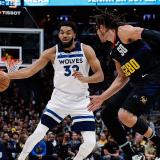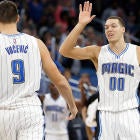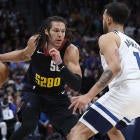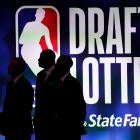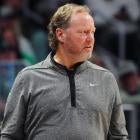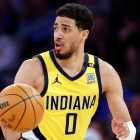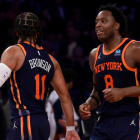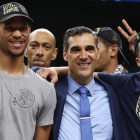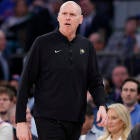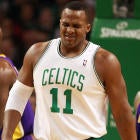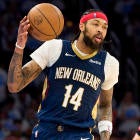Around this time last year, when media outlets were making their predictions on which teams would make the playoffs for the 2018-19 season, many had the Orlando Magic on the outside looking in. SportsLine tabbed them to win fewer than 28 games. ESPN put them at 30-52. FiveThirtyEight gave the Magic a bit more respect, with a 32-50 record. Most everyone was wrong in predicting the growth and development of Orlando.
Not only did the Magic finish with a winning record (42-40), clinching their division and finishing ahead of teams who were predicted to rank well above them -- like the Miami Heat and Washington Wizards -- they even took a game off the eventual NBA champion Toronto Raptors as the seventh seed in the first round of the playoffs, which again, no one expected them to do.
The next step, however, is proving that last season's playoff berth wasn't just a fluke. Nikola Vucevic and Terrence Ross both had career seasons, which earned both four-year deals to re-sign with Orlando. With those two signings, the Magic made a statement that they aren't rebuilding, and that they're here to compete for the playoffs, but it won't be easy.
The Milwaukee Bucks, Philadelphia 76ers, Boston Celtics and Brookyln Nets look to be locks in the playoffs. The Indiana Pacers proved it could hold steady without Victor Oladipo last season, and they'll surely get a boost whenever he returns. The Raptors lost Kawhi Leonard and Danny Green but the rest of their core remains intact. That leaves potentially two spots left for the Magic to fight for positioning. Their competition includes a revamped Miami Heat team that added an All-Star in Jimmy Butler, a Detroit Pistons team that finished one game back of Orlando in the playoff standings, and who knows if a surprise team like the Atlanta Hawks can pop up from the bottom of the East and make a run.
The Magic caught people off guard last season. In 2019-20, they've got some questions to answer in order to get back to the postseason and be taken seriously.
Can Vucevic replicate last season's All-Star campaign?
Nikola Vucevic became a well-known name in NBA circles last season after averaging 20.8 points, 12 rebounds and 3.8 assists on his way to his first All-Star selection. He showcased why he's far and away the Magic's best player every time he backed an opponent down in the post for an easy bucket, or drained 3-point shot. He finished the season posting the ninth-highest player efficiency rating (PER) at 25.5, ahead of names like Steph Curry, Kevin Durant and Damian Lillard.
However, when the Magic played the Raptors in the first round of the playoffs Vucevic was largely contained, being held to 12 points on 36 percent from the field and 23 percent from beyond the arc. Despite his lackluster showing in the playoffs, Magic head coach Steve Clifford believes Vucevic's shooting numbers will be even better than last season.
"I just don't see that he did anything that he wouldn't be capable improving on this year," Clifford said. "It's not like he shot the ball really well from 3-point range. It's not like he shot 43 percent and won't be able to keep that up. I think he'll shoot it even better this season."
Vucevic didn't show any signs of regression this summer when he competed in the FIBA World Cup for Montenegro, averaging a team-high 14 points over five games. If he can somehow outdo his numbers from last season, the Magic won't have to worry about scratching and clawing for the eighth spot in the Eastern Conference.
What's the plan for Markelle Fultz?
The Magic recently picked up the fourth-year option on the former No. 1 overall selection, keeping him under contract with Orlando for at least the next two years. The only problem: Fultz hasn't even played a game for the Magic. In fact, he's only played in 33 games over the span of two seasons, and during a recent Q&A with The Athletic, Clifford said "there's no timetable" for his return.
The last thing Orlando wants to do is rush him along, considering how things played out in Philadelphia for Fultz, but paying a player whose health and availability make you uncertain is a huge risk. Worst-case scenario? Fultz never sees the court for the Magic and they're stuck paying him because no one else will trade for his contract. Best-case scenario, Fultz overcomes -- what many are attributing to his poor shooting touch -- the Yips and he showcases the insane athleticism and playmaking ability he exhibited at Washington. If that does happen, the Magic won't have to rely as heavily on an aging D.J. Augustin to run this offense. Unfortunately that is a huge if, and the Magic still lack a significant amount of depth at the point guard spot.
How can the backcourt improve offensively?
Orlando's backcourt generated 47.2 points per game last season, which was fourth-worst in the league. While Augustin shot a career high from the field and his 42.1 percent from 3 is the second highest of his career, shooting guard Evan Fournier had statistically one of the worst shooting seasons of his career. Fournier shot a career-low 34 percent from deep and 43 percent from the field, an atypical output from a player whose shooting percentage hovers around the upper 40s and 30s from the field and 3-point range, respectively.
Beyond that, Orlando's problems with its backcourt are deeper than Fournier's shooting woes. Depth in the backcourt has long been an issue for the Magic, and aside from Ross' 15 points per game last season -- after splitting time between shooting guard and small forward -- no guard coming off the bench could provide enough quality offense to make an impact. Orlando did little to address this issue in the offseason, too, and with Jonathon Simmons, Jerian Grant and Isaiah Briscoe all gone, one can assume most of the backup guard minutes will go to Michael Carter-Williams.
Carter-Williams provided a boost for the Magic after Briscoe's season was cut short due to a torn meniscus in his right knee, and even averaged 18 minutes a game in the postseason. The former Rookie of the Year's shooting numbers were abysmal, but in the 12 games he played, he posted a positive plus/minus of 5.6, the best on the team. Yes, the small sample size plays a factor, however Carter-Williams' athleticism and defensive play were enough to keep him in the rotation. After securing a one-year deal with Orlando for the 2019-20 season, and the uncertainty around Fultz, Carter-Williams will be relied on heavily coming off the bench.
Can Aaron Gordon have a breakout season?
This will be Gordon's sixth year in the league, and while that sometimes seems surprising considering he's still only 24 years old, he hasn't had that career-defining season that dictates the type of player he'll become. While he shot a career best 44.9 percent from the field and 34.9 percent from deep last season, Gordon doesn't exhibit the ability to take over games on a consistent basis. There were times where him deferring for the betterment of the team meant he was largely invisible on offense.
He worked out some of his efficiency issues from the 2017-18 season where he had a tendency to force shots, resulting in horrendous shooting performances (i.e. 4 of 18, 6 of 21 and 7 of 23 from the field). But for the Magic to build on last season's success, they'll need Gordon to take a big leap. He's committed to a continual improvement of his 3-point shot, already stating in previous interviews that he wants to compete in the 3-point shootout at some point in his career. If his 3-point shot becomes respectable there's a chance he could score 20 points on a nightly basis. His age and versatility on both ends of the floor suggest that there's still room for growth, but with the Magic going all-in on trying to contend in the East for the next few years his progression needs to happen quickly.
The Magic took a small step back into relevance with their playoff appearance last season, but proving that they are here to stay in the Eastern Conference will be the next phase in contending for titles.











